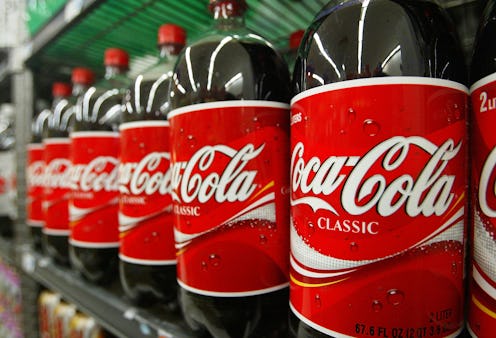News
Most Kids Are Buzzed Off Caffeine
Lucky teachers. Approximately 73 percent of U.S. children and young adults consume caffeine, according to a study published in the journal Pediatrics Monday. The study found that while overall caffeine consumption rates among American youth haven't changed much over the past decade, the means by which the caffeine is delivered has: soda consumption, while still the primary source of caffeine for kids, has actually gone down. Instead, more and more, kids are turning to energy drinks for a buzz.
Even most preschoolers, it turns out, dip into the caffeine well from time to time. The study measured a decline in consumption for children ages two through 11 — down to about a half can of Coke or Pepsi, from the years 1999 through 2010. Narrow that age frame to six through 11 however, and average intake rises to about a full can per day. Teenagers sixteen and over double that figure yet again.
This is the first study trying to chart national caffeine intake rates among kids, and it comes at a time when the role of caffeine, and its increasing prevalence in some products you might not necessarily expect — anyone for some Cracker Jack'D? — is drawing attention. Los Angeles is considering an age-restriction on the sale of energy drinks, amid concerns both that such drinks may be more hazardous than is widely recognized, and may use marketing practices intended to appeal to children.
The concern spurred a 2012 FDA investigation into Monster and 5-Hour Energy, the former having been linked to five deaths and a heart attack, the latter thirteen deaths and dozens of hospitalizations.
The drinks, importantly, haven't been conclusively demonstrated to be to blame in those cases, though the American Society of Pediatrics advises against giving caffeine to children, citing the measurable and well-understood effects it has on the human body, altering the heart rate and elevating blood pressure in particular. As Bustle reported:
Drinks containing caffeine and taurine — two common ingredients in brands like Red Bull and Monster — might actually change the way your heart functions, suggests a new study. The study used 18 healthy participants who, an hour after consuming an energy drink, experienced increased heart contractions. And though that might be OK for healthy, young people, the contradictions can wear down heart muscles over time and be especially harmful for people with preexisting heart conditions.
Conversely, the American Beverage Association, which surely has no reason to be sly about this, wants you to know that caffeine has been a safe flavor enhancer throughout a solid century of use in our soft drinks.
Image: Getty Images
